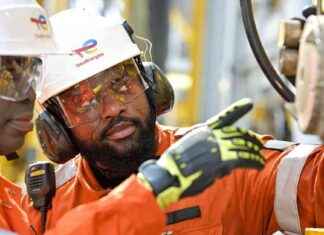Joe Biden wants to triple tariffs on Chinese steel and aluminum, denouncing “unfair competition” for American workers. This is a new appeal to workers in the middle of the electoral campaign.
The White House denounced on Wednesday April 17 “China’s policies and subsidies for its steel and aluminum industries,” according to a press release. Thus, Joe Biden, who hopes to be re-elected in November, calls on the United State Trade Representative (USTR) to “consider tripling the current customs duties”, of 7.5% on average, imposed on a part of Chinese steel and aluminum imported to the United States.
Joe Biden is traveling to Pittsburgh (Pennsylvania), a city with a heavy industrial past, on Wednesday on the second day of a tour of this key state for the presidential election. The Democratic president wants to convince that he is the best ally of workers and unions, and will go to the headquarters of the metalworkers’ union (USW). He recently obtained their support for the election, in particular thanks to his opposition to the takeover of the American steel giant U.S. Steel by the Japanese Nippon Steel.
The USW had in passing scratched the Republican candidate, former President Donald Trump, who is also trying to win the votes of blue-collar workers and presents himself as the champion of the revival of the American manufacturing industry. He promises to significantly increase customs duties if he is elected.
Investigation into “China’s Unfair Practices”
The Biden administration also announced Wednesday the launch of an investigation into “China’s unfair practices in the shipbuilding, shipping and logistics sectors.”
It will be led by the USTR and responds to a request from trade union organizations in the sector who denounce Chinese policies “much more aggressive and interventionist than any other country”. “Steel is an essential component of our domestic shipbuilding industry,” says the White House.
The White House’s announcements come against a backdrop of strong rivalry with China, despite renewed dialogue between the two countries, and measures to limit the United States’ dependence on Chinese industry.
The Biden administration cites “growing concerns that China’s unfair trade practices, including flooding the market with steel sold below market cost, are distorting the global shipbuilding market and eroding competition.”
Lower international demand
The American Secretary of the Treasury, Janet Yellen, a week after a trip to Beijing, met her Chinese counterpart in Washington on Tuesday, as part of the spring meetings of the IMF and the World Bank. The question of China’s overproduction, in particular, was addressed again.
Concerns about overcapacity in China’s steel industry have grown since its construction sector slowed sharply, freeing up products for export. Faced with the slowdown in real estate which is driving its growth, China is in fact massively subsidizing certain industries, despite less strong international demand.
The European Union has engaged in a standoff with Beijing, which it accuses of distorting its market by flooding it with low-cost products, not just for metals. In Latin America, the steel industry is worried and is demanding import taxes.






